|
|
|
Sort Order |
|
|
|
Items / Page
|
|
|
|
|
|
|
| Srl | Item |
| 1 |
ID:
138447


|
|
|
|
|
| Summary/Abstract |
The development of the casino industry in Macao and Singapore has been attracting substantial interest from both the academic sector and overseas casino operators. Extending from earlier academic efforts to account for the rise of casino capitalism, this article aims to examine the emergence, evolution and dimensions of casino governance with regard to these two jurisdictions. The article compares and contrasts the salient features of casino governance in Macao and Singapore in terms of the recruitment and management of casino staff, casino-society relations, crime control, casino-junkets relations and casino-government interactions. Casino governance in Macao has performed better in managing casino staff harmoniously, dealing with employees’ unions and society skilfully, and maintaining partnerships with the Macao government. However, in terms of crime control and relationships with junkets, casino governance in Singapore has developed a stronger regulatory capacity than that in Macao.
|
|
|
|
|
|
|
|
|
|
|
|
|
|
|
|
| 2 |
ID:
138454
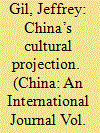

|
|
|
|
|
| Summary/Abstract |
China’s re-emergence as a great power will depend largely on its ability to create a favourable external environment. In order to create this environment in the 21st-century world, China must use its power resources in ways suitable for engaging with and gaining the support of the diverse range of actors that now make up the world political system. As such, China has increasingly emphasised the use of its power resources for attraction, appeal, persuasion and co-option. Culture is regarded as an especially useful resource for such purposes, and China has been actively promoting and projecting elements of Chinese culture throughout the world. This article aims to map and evaluate China’s cultural projection, with a particular focus on its Confucius Institute (hereafter CI) project. It uses academic literature, media reports, internet documents, interviews with people involved in or with an interest in the CI project, interviews with Chinese-language teachers, and a survey of Chinese-language students’ views in order to argue that while the CI project has reached much of the world and conducted numerous activities in a short space of time, its contribution to crafting China’s desired external environment has been somewhat uncertain and limited.
|
|
|
|
|
|
|
|
|
|
|
|
|
|
|
|
| 3 |
ID:
138452
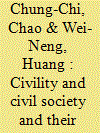

|
|
|
|
|
| Summary/Abstract |
This article examines the development of civil society and its relationship to democratisation in Taiwan. Civil society, through collective activities organised by civil groups, has been presumed to play a critical role in protecting citizens from the state’s overextended interference in people’s lives, which in turn safeguards their civil rights. This article proposes, however, that in Taiwan’s case, before citizens were allowed to organise civil associations, some intellectuals had already devoted themselves to the pursuit of democracy through their individual activities. Such activities transformed a political constraint into an opportunity structure, allowing civil society and democratisation to develop.
|
|
|
|
|
|
|
|
|
|
|
|
|
|
|
|
| 4 |
ID:
138450
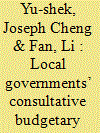

|
|
|
|
|
| Summary/Abstract |
The Chinese leadership is still reluctant to accept any reforms that are perceived to cause an erosion of the Communist Party of China’s monopoly of political power, although it is eager to improve governance, especially at the grassroots level. Participatory budgetary reforms as represented by the Wenling model are therefore perceived by some academics and local reformers as a channel through which breakthroughs in grassroots democracy in terms of public participation and government accountability can be achieved. Apparently this has gained some support from the top leadership—because some leaders are keen to reduce deficits and ensure budget transparency and accountability in local governments as well as at the top leadership—which now wants to combat corruption. Naturally, there is strong resistance because local governments are unwilling to limit their room for manoeuvre in terms of government expenditure and give up their control of extra-budgetary funds. While existing literature concentrates on the reform model and its rationale, this article offers a detailed empirical description of the actual reform processes at the local level. The Wenling consultative budgetary reforms were lauded and encouraged by Hu Jintao’s report to the 18th Party Congress on 8 November 2012. This offered the official support that the reformers needed, and provided the momentum they required to continue reforms and even promote them in other local governments. Of particular concern, however, is the intention of the Chinese leadership to incorporate this type of consultative mechanism into the framework of the Chinese People’s Political Consultative Conference; such a change would fall below the expectations of those who wish to secure breakthroughs in political participation.
|
|
|
|
|
|
|
|
|
|
|
|
|
|
|
|
| 5 |
ID:
138453


|
|
|
|
|
| Summary/Abstract |
When can non-governmental organisations (NGOs) affect government policies in a strong authoritarian Party-state like China? What is the status quo of state-society relations in China in the new century after decades of reform? Based on the literature of interest groups, state-society relations and civil society, this article builds and tests three hypotheses: the government-guided participation, NGO resource and vertical network. These hypotheses are tested through a quantitative study based on survey data. Findings have shown that the government-guided participation hypothesis is well-supported empirically, while the other two hypotheses have limited corroborating evidence. The Chinese political system is therefore still very much authoritarian and closed after more than two decades of reform and an “associational revolution”. It is also likely to follow a corporatist model instead of a pluralist model of state-society relations.
|
|
|
|
|
|
|
|
|
|
|
|
|
|
|
|
| 6 |
ID:
138445
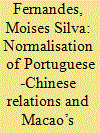

|
|
|
|
|
| Summary/Abstract |
Although many people believe that small or medium powers tend to be very concerned with overseas territories, this was not true in the case of Macao. The great power, mainland China, showed very little interest in foreign affairs, because it knew that the outcome of the handover would be in its favour. Nonetheless, from May 1974 to July 1975, both China and Portugal had to demarcate their positions. The Portuguese entered into informal conversations with the Chinese ambassador to France, Zeng Tao, in August 1975, which lasted until January 1978, a total of almost three years. As soon as power in mainland China shifted from the leftists to the moderates, however, the new ambassador in Paris, Han Kehua, made it clear that he wanted things settled in six months. However, in 1978, the Portuguese cabinet had three different prime ministers and three different ministers of foreign affairs. Ultimately, the Portuguese cabinet had to give in to mainland China, on 8 February 1979.
|
|
|
|
|
|
|
|
|
|
|
|
|
|
|
|
| 7 |
ID:
138451
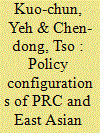

|
|
|
|
|
| Summary/Abstract |
This article predicts future policy configurations of PRC (People’s Republic of China) and East Asian emerging economies using Mundell’s trilemma and its quantitative measurement. Due to fear of capital flows and exchange-rate volatility, the East Asian emerging economies may still choose a collective exchange rate stability mechanism, which constitutes exchange rate stability, monetary independence, and limitation on capital flows with the support of precautious reserve accumulation and multilateral currency swaps. That is, a Bretton Woods-style mechanism will still be feasible after the global financial crisis. On the other hand, East Asia may be willing to decrease precautious reserve accumulation once a new international currency can be launched. However, the PRC’s attitude will be the critical factor.
|
|
|
|
|
|
|
|
|
|
|
|
|
|
|
|
| 8 |
ID:
138446
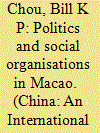

|
|
|
|
|
| Summary/Abstract |
Major social organisations in Macao fulfil the political and social functions of political mobilisation and participation, the provision of social services on behalf of the government and the co-optation of social forces by being the agents of the Chinese government in the execution of its united front policy and the vehicles of the Macao government for winning supporters. From the perspective of historical institutionalism, Macao’s political design, which centres on social organisations and dates back to the Portuguese era, is path-dependent on the modified corporatist model. By embedding social organisations into its political institution, the state can mobilise social forces to undertake state functions and weaken political opposition. Major social organisations face major challenges in their conflicting political and social functions, which weaken their ability to fulfil the role of the government’s partners and allies.
|
|
|
|
|
|
|
|
|
|
|
|
|
|
|
|
| 9 |
ID:
138449
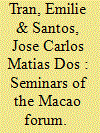

|
|
|
|
|
| Summary/Abstract |
This article reviews the role that the Macao Special Administrative Region (SAR) plays in China’s cultural and public diplomacy through training programmes organised by the Macao Forum and tailored for the elite of the world’s Portuguese-speaking countries (PSCs). It begins with a review of China’s approach to key instruments of its soft-power offensive and strategy towards the developing world, followed by an overview of Beijing’s linkages with each PSC. Formulated as an expression of China’s cultural diplomacy towards the PSCs, the seminars of the Macao Forum serve as a kind of cooperation in which the provider party—rather than delivering tangible goods and services such as food, money, loans or infrastructure—actually offers grey matter in the form of ideas for initiatives in public policies and reforms, in order to foster further economic development and administrative rationalisation. Adding to an intense debate and substantial literature that discuss quantitatively and qualitatively China’s role in and aid provision to Africa, the authors argue that China, through the Macao Forum’s training programmes, courts the developing PSCs by building the capacity of their human capital, targeting in particular those in the public and private sectors who are in a position to implement their ideas.
|
|
|
|
|
|
|
|
|
|
|
|
|
|
|
|
| 10 |
ID:
138448
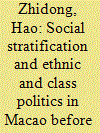

|
|
|
|
|
| Summary/Abstract |
This article examines the changes in ethnic and class politics before and after the handover of Macao in 1999. Even though the domination of Macao politics has largely transferred from the Portuguese and Macanese to the Chinese, the former two groups still retain much power in the legal arena. The Chinese upper class played an instrumental role in Macao politics before the handover and became fully dominant after 1999. For example, they have maintained a large presence on the Executive Committee and in the Legislative Assembly, successfully prevented further democratisation, and protected their interests by delaying the legislation of a minimum wage and barring the collective bargaining power of workers. The working class’ main interests fall in the area of wage increases and protecting their jobs from imported labour. However, they would occasionally join forces with the middle-class movement for democratisation. This article uses statistical data from various sources and applies the critical approach in sociology, namely, historical-comparative analysis, to the study of ethnic and class politics. This analysis will shed light on a scarcely studied issue in Macao and its future prospects of democratisation.
|
|
|
|
|
|
|
|
|
|
|
|
|
|
|
|
|
|
|
|
|